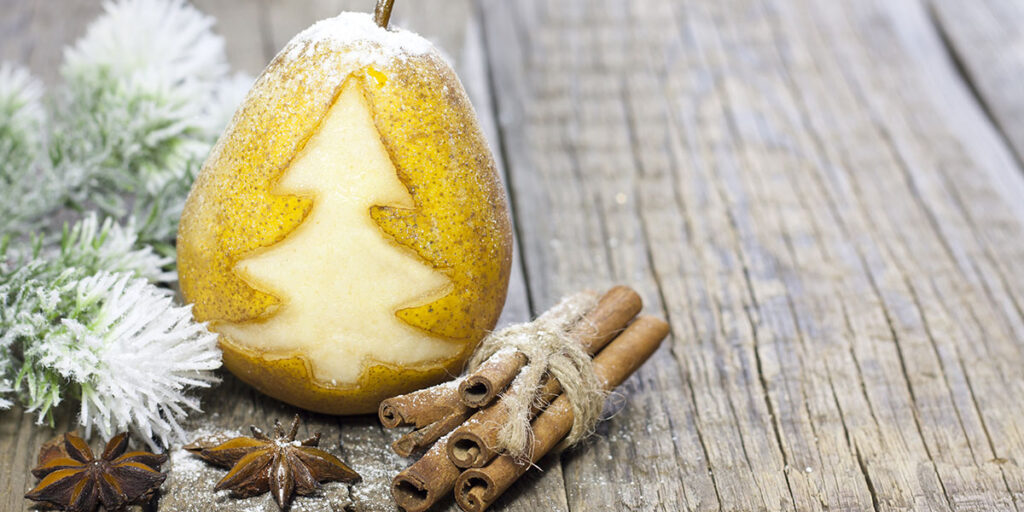Advertisement
25 Holiday Health Hacks
Quick, easy tricks for your healthiest winter ever

The weather outside may be frightful, but we’ll feel delightful with these quick holiday health hacks. They’ll help us navigate the many potential health, fitness, beauty, and dietary pitfalls of the winter season.
Advertisement
1: Reach for fibre
Before caving to the temptation of a sugary holiday treat, eat some fibre. This limits the subsequent spike in blood sugar. Adults need 21 to 38 g of fibre daily.
Advertisement
2: Add protein to every meal
Many of us eat carb-rich breakfasts and protein-heavy dinners, but we should add protein to every meal. Studies have found that spreading out our protein intake may enhance weight loss and improve muscle health.
Advertisement
3: Banish dry winter skin
Moisturize skin from the inside out with omega-3 fatty acid supplements. These essential fatty acids reduce dry skin symptoms, soothe inflammation, and guard against signs of aging.
Advertisement
4: Stay hydrated
Just because it’s not hot outside doesn’t mean we need less water. Staying hydrated helps with digestion and removal of waste, improves physical performance, maintains healthy blood pressure, and keeps our skin healthy.
Advertisement
5: Pop probiotics
Probiotics aid digestion and may improve skin health, prevent colds, and more, but the benefits aren’t just physical. Some probiotics may also help reduce negative thoughts and boost our mood so we’re as jolly as Santa himself.
Advertisement
6: Butt out butter
Holiday baked goods typically call for a generous amount of butter. Avocado, applesauce, extra-virgin olive oil, and Greek yogurt can often be substituted for butter in recipes if you’re concerned about reducing saturated fat.
Advertisement
7: Sleep before the feast
Get enough sleep before that holiday party. In one study, people who slept just a third less than they usually did, ate more than 500 extra calories per day.
Advertisement
8: Mellow out with magnesium
When holiday stress gets under your skin, ask your health care practitioner about magnesium. More than one-third of Canadian adults don’t get enough of this mineral. Our brain needs magnesium in times of stress, and this mineral has been linked to preventing or reducing the effects of anxiety and depression.
Advertisement
9: Wear sunscreen
Most of the sun’s damaging ultraviolet rays penetrate cloudy winter conditions, and snow reflects up to 80 percent of UV radiation, making it worse than sun glare off beach sand or water. Wear sunscreen with a minimum sun protection factor (SPF) of 30.
Advertisement
10: Combat SAD
Up to 21 percent of Canadians experience some form of seasonal affective disorder (SAD). Taking vitamin D may help prevent SAD, and 40 percent of us don’t get enough vitamin D in the winter.
Advertisement
11: Have a cuppa
The amino acid L-theanine, found in teas (especially green tea), may increase brain activity and cognitive function when we are trying to pay attention to important tasks, such as finishing our holiday shopping lists.
Advertisement
12: Clean up cocktails
Beware the liquid calories at holiday parties. Try these healthier swaps: ask for sugar-free club soda as the mixer, and use whole foods such as fresh fruit instead of artificially flavoured mixes.
Advertisement
13: Walk away from a cold or flu
Just 20 minutes of walking a day strengthens the immune system. Researchers aren’t sure exactly why this is the case, but suspect that exercise flushes bacteria out of our lungs and raises our body temperature to prevent bacteria from growing into a serious infection.
Advertisement
14: Sprinkle cinnamon spice for all things nice
Cinnamon may help lower blood sugar levels, according to several studies. Use it in Christmas drinks and treats. Ceylon cinnamon may be the best choice if you consume a lot of cinnamon. Its cousin, cassia cinnamon, has a higher coumarin content and could pose health risks in high doses.
Advertisement
15: Ease digestion
Rich holiday foods can be a recipe for digestive disaster. Digestive enzyme supplements, such as bromelain, may improve digestion.
Advertisement
16: Nab a nap
Speaking of sleep, a 10-minute nap can dramatically improve our productivity. Follow your circadian rhythm. The hours between 1 and 3 pm are the perfect time to catch a nap for many adults.
Advertisement
17: Kick insomnia
From in-laws to gift shopping, many things can keep us up at night. Melatonin has long been the go-to supplement for sleep problems, but don’t overlook 5-hydroxytryptophan (5-HTP). The brain converts it into serotonin, which can help with anxiety and sleep.
Advertisement
18: Try noncaffeinated energy
Don’t want the jittery effects of coffee after a nap? Consider taking a ginseng supplement. Studies have suggested it may battle fatigue.
Advertisement
19: Boost your metabolism
Feel warm inside and manage weight this winter with capsaicin. It’s the compound in cayenne and other peppers that gives them their heat. Studies have shown capsaicin helps burn calories and fat.
Advertisement
20: Create a physical holiday tradition
Physical activity levels plummet with the thermometer—64 percent of us are inactive in the winter versus 49 percent in the summer. Create memories and burn calories with your favourite snow sport. For example, a 150 lb (68 kg) adult burns 272 calories in 30 minutes of snowshoeing.
Advertisement
21: Use the three-bite rule
The first nibble of that seasonal dish sparks the taste buds, but every bite after that has diminishing returns of pleasure. Try the three-bite rule. This satisfies our cravings and lets us indulge without going overboard.
Advertisement
22: Sip detox teas
If we’ve broken our three-bite rule, detox teas may help flush our systems. Examples of herbal remedies include green tea, dandelion root tea, ginger root tea, and senna tea.
Advertisement
23: Recover with adaptogens
If we feel fatigued and run down at the end of the holidays, adaptogens—plant compounds that help us adapt to and avoid damage from environmental factors—may help. Examples include rhodiola, schisandra, and Siberian ginseng.
Advertisement
24: Freshen the air
In the winter, our home or office air is up to 85 percent recirculated, causing a buildup of pollutants. Invest in an air filter or try Mother Nature’s filters: aloe and spider plants are just a couple of houseplants that filter out indoor pollutants.
Advertisement
25: Meditate to a new year
Cut through this month’s mental clutter with meditation. It helps reframe stressful holiday events, releases negative thoughts, and counters stress-related health problems such as high blood pressure.
Check with your health care practitioner before taking supplements to ensure they are right for you.





